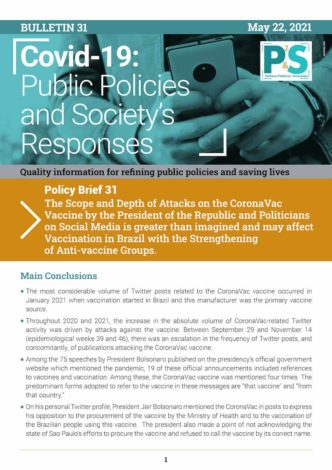Main Conclusions
- The most considerable volume of Twitter posts related to the CoronaVac vaccine occurred in January 2021 when vaccination started in Brazil and this manufacturer was the primary vaccine source.
- Throughout 2020 and 2021, the increase in the absolute volume of CoronaVac-related Twitter activity was driven by attacks against the vaccine. Between September 29 and November 14 (epidemiological weeks 39 and 46), there was an escalation in the frequency of Twitter posts, and concomitantly, of publications attacking the CoronaVac vaccine.
- Among the 75 speeches by President Bolsonaro published on the presidency’s official government website which mentioned the pandemic, 19 of these official announcements included references to vaccines and vaccination. Among these, the CoronaVac vaccine was mentioned four times. The predominant forms adopted to refer to the vaccine in these messages are “that vaccine” and “from that country.”
- On his personal Twitter profile, President Jair Bolsonaro mentioned the CoronaVac in posts to express his opposition to the procurement of the vaccine by the Ministry of Health and to the vaccination of the Brazilian people using this vaccine. The president also made a point of not acknowledging the state of Sao Paulo’s efforts to procure the vaccine and refused to call the vaccine by its correct name.
- Social media influencers and state and federal congressional representatives played an important role in the digital debate on CoronaVac by sharing messages that questioned the vaccine’s efficacy.
- Five delays in delivering Active Pharmaceutical Ingredients (AFI) from China required to produce CoronaVac doses have occurred. The delay in the arrival of these raw materials resulted from bureaucratic processing times at Beijing’s airport and not because of complications in the vaccine supply from Sinovac to Butantan. On two of these occasions, the shipments never arrived. The available data suggests a deficit in delivering 7 thousand liters of AFI within this period, which corresponds to 10.5 million vaccine doses. Additionally, another 4 thousand liters of AFI are still in transit and have not yet arrived in Brazil.
- Using the updated planning schedule provided by the Ministry of Health and considering the delays in AFI deliveries from China to the Butantan Institute, we find a deficit of 12 million doses that should have been distributed to Brazil’s Unified Health System (SUS).
Work group responsible
- Lorena Barberia (USP)
- Pedro P. Bruzzi (FGV-CEPESP)
- Leonardo Barchini-Rosa (FGV-CEPESP)
- Isabel Seelaender (USP)
- Maria Letícia Claro de F. Oliveira (USP)
- Tatiane C. Moraes Sousa (USP)
- Gabriel Zanlorenssi (USP)
- Felipe Vilela (USP)
- Rebeca de Jesus Carvalho (FGV-CEPESP)
- André Garibe (USP)


